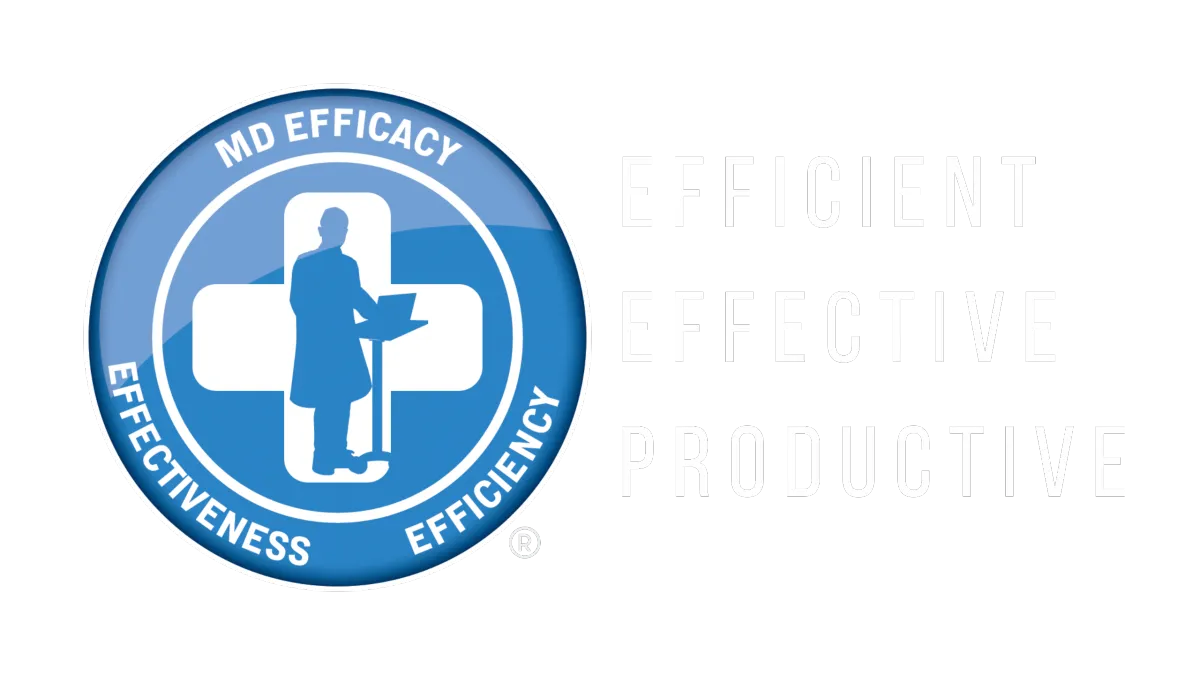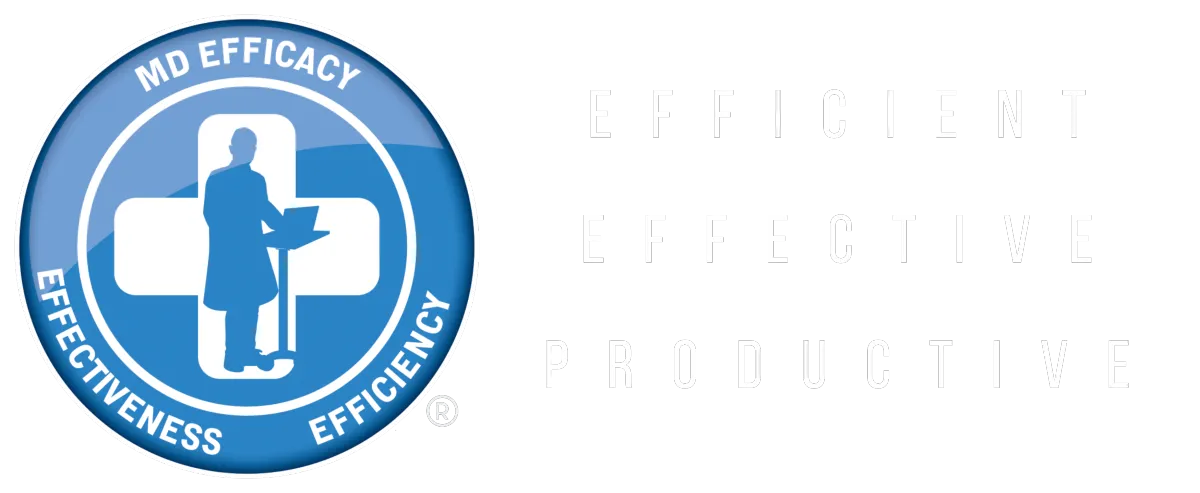Efficiency & Effectiveness are Important
Posted Nov 29, 2024
Medicine is an art. It is a true art that we get to learnduring our study during the medical school and residency and fellowship andwhatever training we get. We learn the art on how to heal patients, how to helpthem in that path of healing. And there is also an art in how to manage ourpractice in medicine. The art of how to be efficient and effective. This is theword of efficacy. I'm Michael Marcos. I'm an endocrinologist at IndianaUniversity School of Medicine and I'm so lucky to get to practice medicine inan academic setting. So I get to practice the clinical medicine and theacademic medicine. And I got so intrigued about the art of how to practicemedicine outside of actual than actual knowledge of medicine. The art of how tobe efficient and effective. And that's why I came with the idea of MD efficacy.That combination of the two words. Efficiency is easy to understand. You wantto start on time and finish on time while having everything done. So you don'twant to work after hours or before hours. So if my clinic goes from 8 to 4 Istart work by 8, 7, 50 around that time. And I finish work by 4, 4, 10, 4, 15,not later than that. And then there is no work outside of that. And to expandon the efficiency or can I see more patients in that time interval. And itbecame like again when I'm challenging myself. How far I can go while stillbeing very effective. So this is the efficiency part. How fast you can climbthe ladder. And then effectiveness. And in effectiveness I mean getting theright job done. As a physician I'm treating patients. So I wanted the patientsto have good results. As an endocrinologist I treat patients with diabetes. Ifthey really work on it, can we achieve even C below 7, below 6.5%. My mainfocus of practice is the thyroid. Are my patients with overactive thyroid arebeing well controlled? Hypothyroid are they well controlled and feeling well?The same applies to any specialty. Am I getting good results? This is the firstaspect of effectiveness. But there are other aspects of effectiveness. Are thepatients satisfied with the care? We are living in an era where all of thepatients get to write reviews about you. So are you having good reviews? Arethe patients satisfied? We get audited for quality metrics or assessed forquality metrics. Are the leaders happy with the results I'm having in myquality metrics? It gets to be very exciting and interesting when I havetrainees in the clinic. And these trainees when they come they want to learnmedicine which is very valid. But then I ask them about everything else outsideof medicine. Do you know how can you maintain good patient satisfaction scores?Do you know the quality metrics and what we get assessed for? And also do youknow the billing and coding which is another part of effectiveness? Are myproductive or not? Do I know the ins and outs of the billing and coding? And Iremember as a fellow there was a billing and coding course offered by one ofour societies. And I asked all of my colleagues and actually mentors if they wantto join me in attending that coding course. And as you can imagine no onewanted to join. But then when I came back from this today course gosh it wasvery enlightening and my approach to billing and coding is very different. Andthen I go to understand that what we consider as complex maybe for CMS theCenter for Medicare and Medicaid Services and the American Medical Associationwho set these billing and coding guidelines it is not complex. And what I mayconsider as very simple they may consider as complex. And then in order for usto come into a middle ground we need to have a common language that is writtenin the notes. And this is what my insight about the notes as well go to bedifferent. It's a very important topic that I'm gonna get to talk about as wemove forward. But back to the idea of efficacy. How to be efficient and how tobe effective. Very important. During our training we get to learn medicinewell. I hope we get to learn it well right. We spend tons of years in investingin ourselves to learn medicine. So usually, usually physicians are doing prettywell from the medicine standpoint. And I'm not planning to talk about medicine.But what we don't get to learn is how to run a practice. How to be efficient.How to ensure that the other aspects of our lives are well maintained. Imagineour lives as a house. And then this house has walls. In the medicine and thatcareer we are building one wall. And we hope that we are building it very well.Maybe added to that wall wealth. So we hope that we're gonna get productive andwe're gonna have good revenue. And get good return on our investment inlearning medicine and practice and medicine. But then there are other walls.There's the social aspect. There's the family. If you have a family this isvery important. Your presence in your family is crucial. And no one gonnareplace you there. Your community, if you are active in the community, it isgreat because it completes our personality and our mission in life. Career isnot everything. Medicine is not everything in our lives. And it gets to be verychallenging when we don't have good boundaries. And when we see no stop. Nomore work after hours. Oh I'm done with the clinic. I'm not opening myelectronic health record. I'm not getting to my in-basket or inbox. I'm notgetting to these labs or messages or phone calls or pre-chart and for the nextday. I'm not doing that. I'm focusing on what I need to focus on right now.This is not easy. And actually we learn the complete opposite during ourtraining. We learn that if you call the patient at 9 or 10 p.m. you are a greatphysician. You are very invested in patient care. I think this is completelywrong. It just messes up our lives. And then I feel so sad for some of mymentors who were great physicians but then they had destroyed families. Whetherended in divorce or kids with addictions or those who were very active in thecommunity or had hobbies that they are no longer doing them because becausepatient care took over all of these. We don't want that. We don't want to livea life that is good fulfilled. We do very well during our work hours and we geteverything done so that when we leave home there are no tails. I think thisshould be the goal. This is the goal for me for myself and I recommend you tohave the same goal in your life as well. I would like to finish here by havinga suggestion for you. We can choose to be one of two things. A complainer or adoer. A complainer we see the problems. We feel the problems but then would wedo something about the problems or would just complain about them. If I am inyour shoes I will recognize the problem and I'll do something. I'll act on it.That's why I got so interested in that topic. I got so interested in thatcontinuous quality improvement. Every one or two weeks I'm making some change.I'm working on refining something. I'm helping building something and as webuild it one step over the other over months to few years you can see a hugedifference in how you are practicing. And also that's why I wrote the two books"No Work After Hours" to make sure that we don't work before or afterhours and "Physician Productivity Secrets" or "Physician RevenueSecrets" so that we can understand how truly we can make money. How can weadjust our workflow and work on it? I'm planning in this YouTube channel tohave regular videos so that I can share some insights and some thoughts andplease if you have questions don't hesitate to reach out. We'll see in the nextvideo.
MD Efficacy © 2026, All Rights Reserved.
By visiting this page, you agree to Terms of Use, Privacy Policy, & Earnings Disclaimer.

